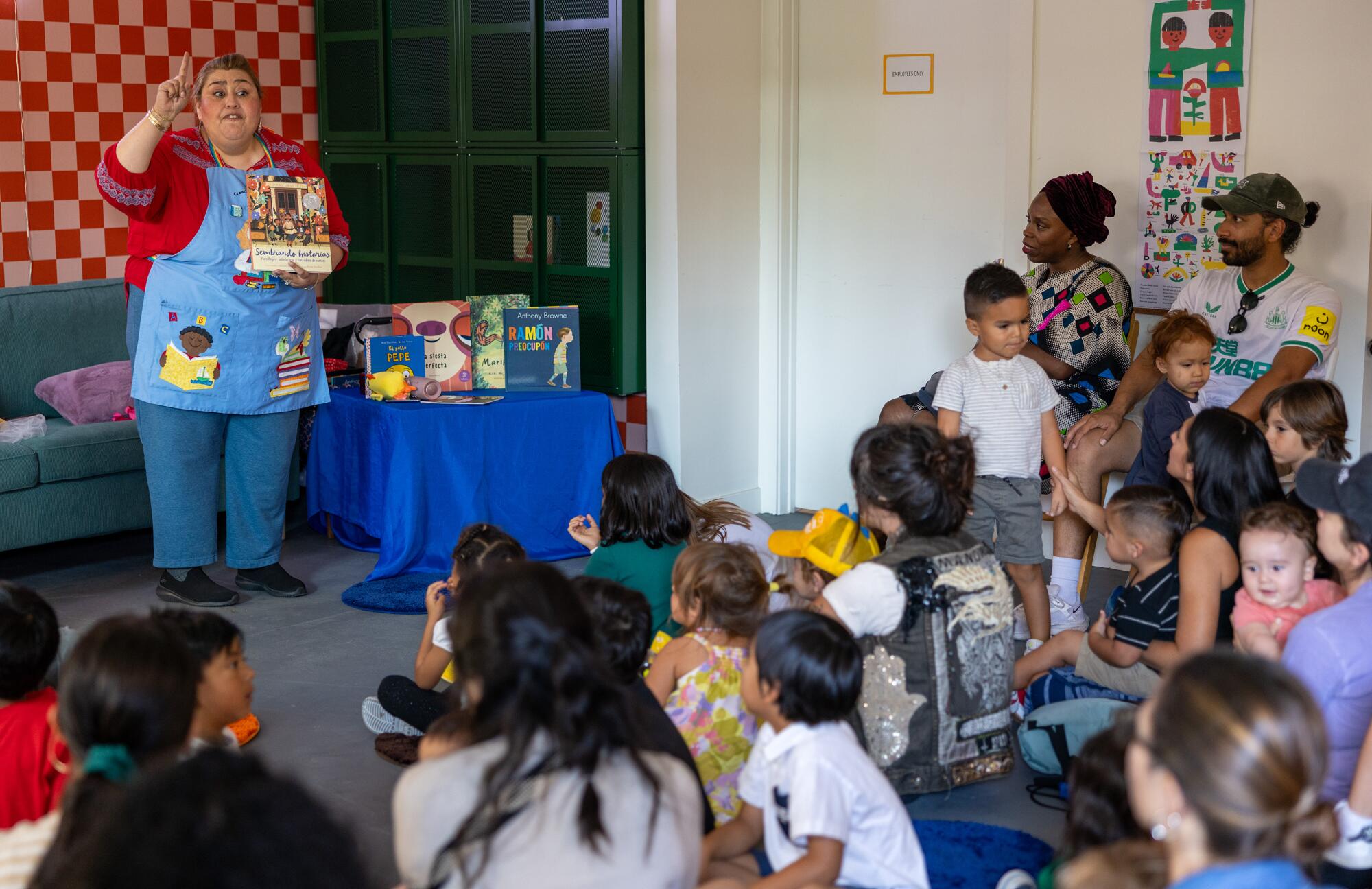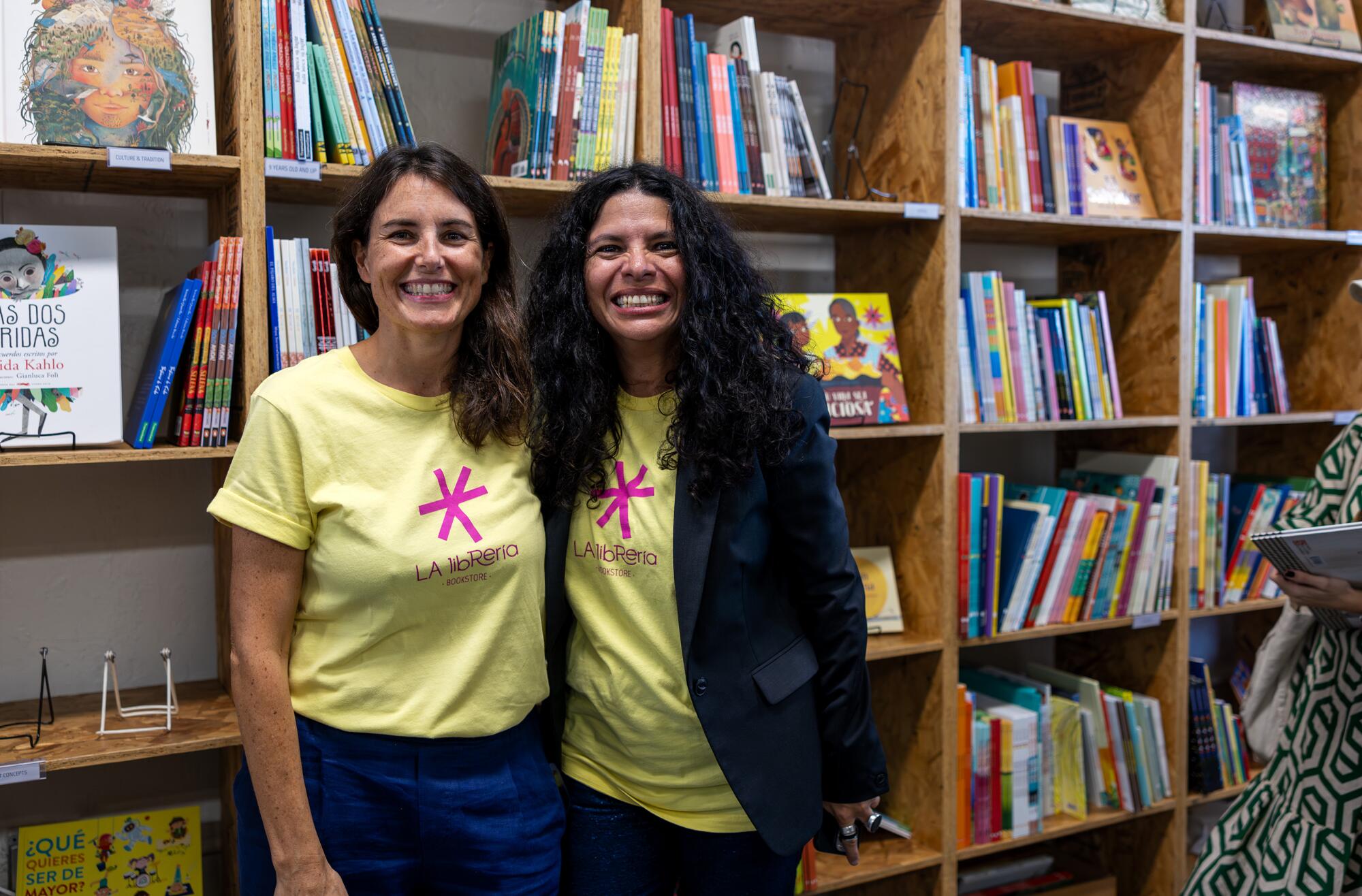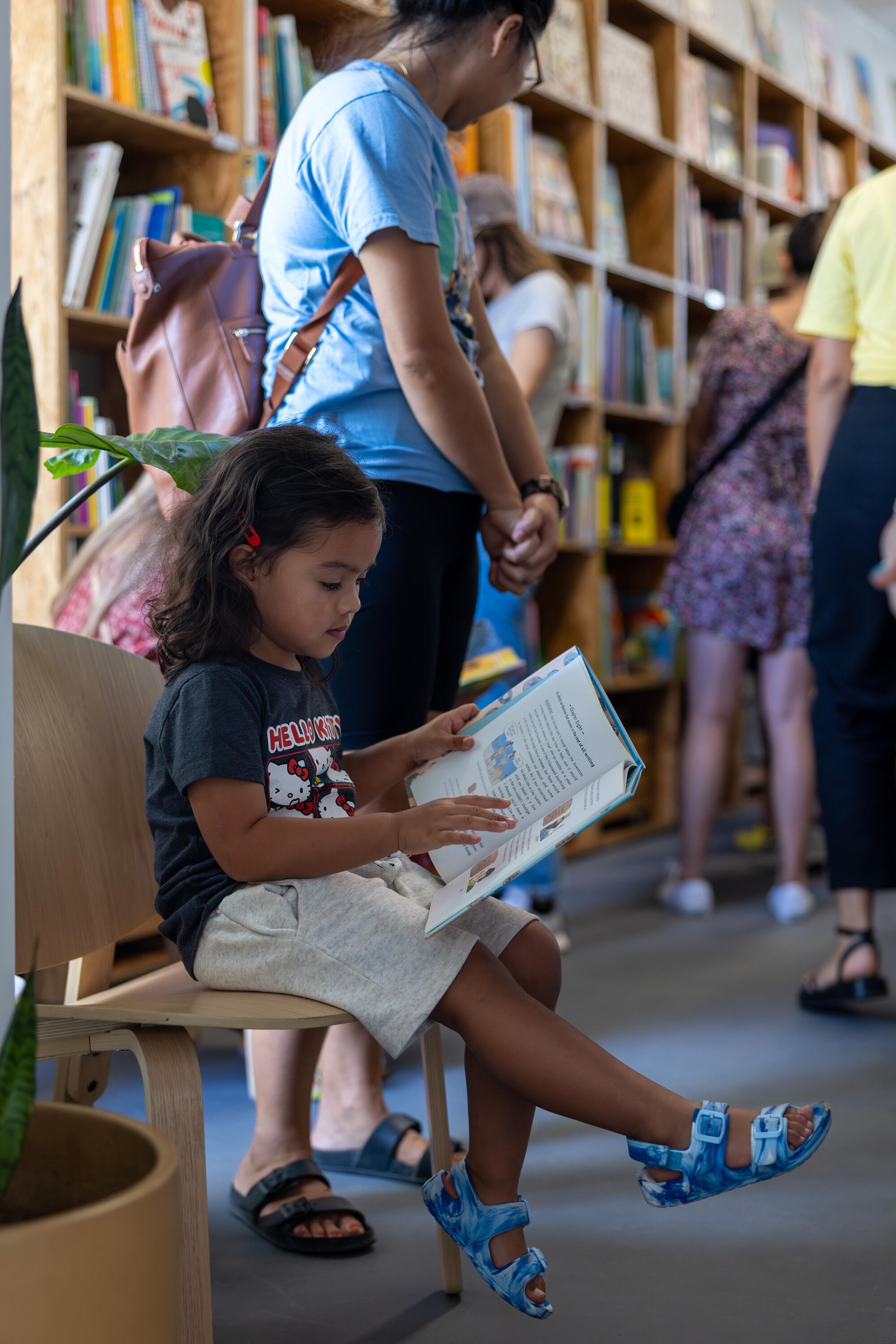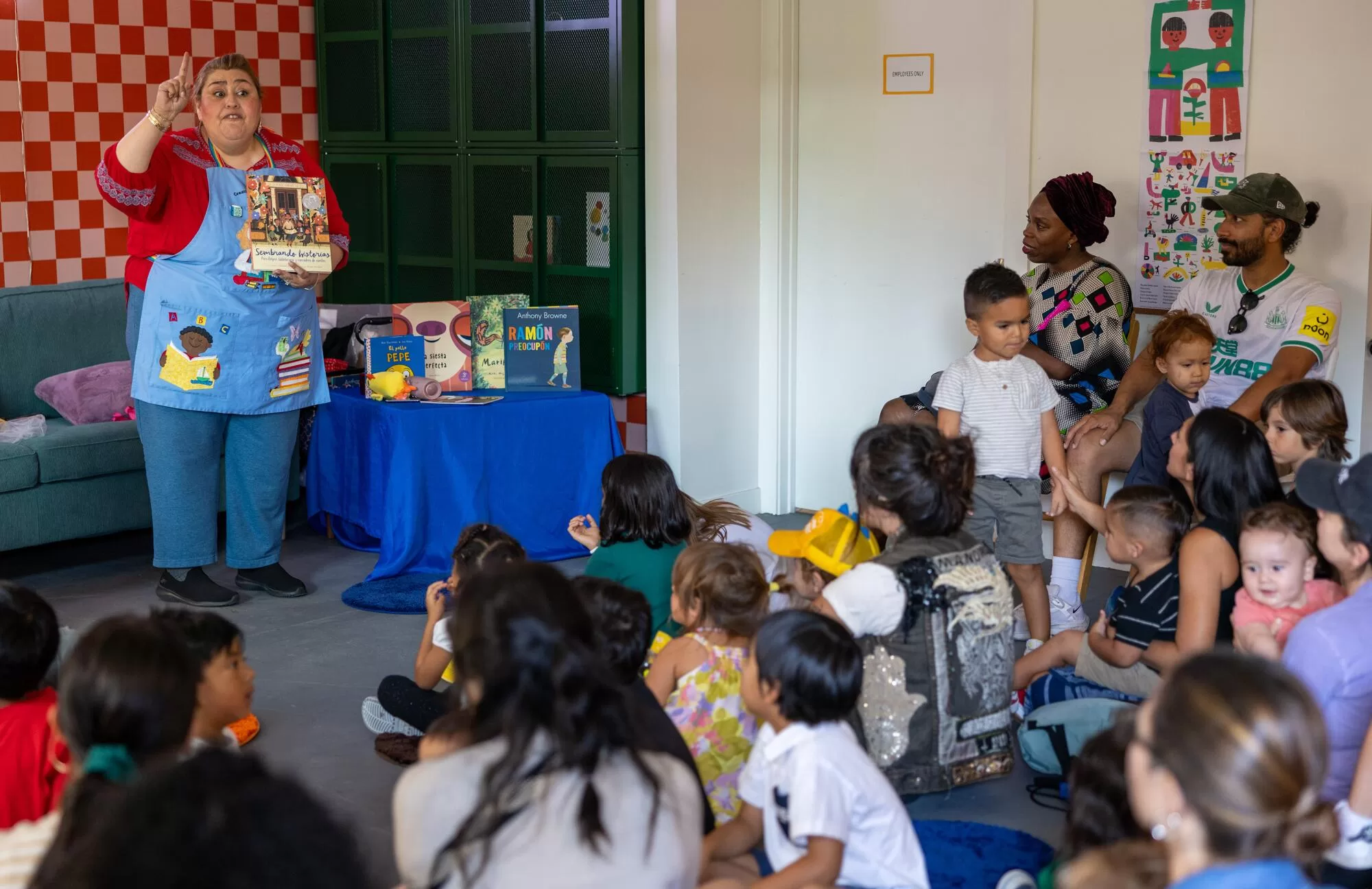Inside LA Librería’s new West Adams location, a hush falls over the thick crowd of multigenerational families. Angelica Sauceda, a librarian at Anaheim Public Libraries, faces an audience of young readers ready to hear the bilingual story of “La Siesta Perfecta.”
“Es hora,” she calls out. It’s story time.
On Sunday, the only children’s Spanish-language bookstore in Los Angeles invited customers to celebrate the grand opening of their biggest storefront yet. Back in 2012, founders Chiara Arroyo and Celene Navarrete set out with the goal of providing quality, imported Spanish-language titles to local schools and bilingual families. And their newly opened 2,400-square-foot location marks the moment they have been patiently waiting for — the ability to bring their community together in a space that finally fits.
“When we were an appointment-only showroom, people were always knocking on the door trying to get in. When we opened a small storefront, we didn’t have enough space for events. Most of the time, all the kids would have to be inside and all the parents wait outside,” said Arroyo. “We needed more space to move.”

Children listen during story time at LA Librería on Sunday, where customers were invited to celebrate the bookstore’s largest space yet.
(Sarahi Apaez / Los Angeles Times)
Arroyo and Navarrete first crossed paths at their children’s elementary school, Edison Language Academy. Navarrete, a professor of coding and computer information systems at Cal State Dominguez Hills from Mexico, and Arroyo, a former film critic from Spain, both volunteered at the school’s book fair. Given the dual-immersion aspect of the school, they remember how few Spanish titles were being sold.
“We were surprised. We didn’t like the selection very much. Some [books] had mistakes or were full stereotypes,” Arroyo said. “Given how many people in L.A. are interested in learning Spanish or raising children in a multicultural environment, it was shocking that you couldn’t even find books in Spanish in a bilingual program.”

LA Librería co-founders Chiara Arroyo and Celene Navarrete at Sunday’s celebration of their larger space. In the early days, they operated their bookstore out of an old hair salon.
(Sarahi Apaez / Los Angeles Times)
Instead of complaining, they took action. With Navarro’s background in technology and Arroyo’s experience in the publishing industry, the two were able to muster enough books together for the next fair, where they had their own curated Spanish-language literature table. Hand-picking each storybook, the pair says they are able to understand the market and the community’s needs so well because they encounter the same difficulties with their own bilingual families. As the word got around, they began selling at schools all around L.A. until officially becoming La Librería in 2012.
As busy parents, the duo couldn’t commit to being in a store for eight hours a day, so they started off with an appointment-only showroom model. Operating out of an old hair salon in West Adams, the demand for their collection only continued to increase. In 2015, they settled into a small office space on Washington Boulevard in Mid-City where they were able to open up a more typical-looking bookstore. They began to host readings and events, but given how many people would show up, they say the space quickly became unsustainable.
“When we were selling at these fairs, many people didn’t even know these kinds of books existed until they saw them. Let alone know they are available in a city like Los Angeles and in their schools,” said Arroyo. “To have access to these books in your family’s language is a huge thing and can open up a discussion, especially because the language has been so stigmatized in the past.”
Skimming the shelves while carrying her daughter, new mother Crystal Morales recalls her own relationship to Spanish. Because of the language’s marginalization, she was taught to understand her parents’ tongue but never to speak it. Now living in La Verne, she wants to ensure her baby can speak both English and Spanish fluently.
“I don’t remember having any Spanish books in my [childhood] home, and now I would say half of the library at home is in Spanish. I am definitely a ‘no sabo kid’ and I don’t want my daughter to grow up the way I did,” Morales said. “Now Spanish is so embraced and the more bilingual you are, the more of an asset it is.”
Today, LA Librería is housed in a 2,400-square-foot space whose hybrid look is part modern style and part old-fashioned facade. With glass front-facing windows and raw wooden bookshelves, the store is filled with anything from graphic novels and picture books to poetry anthologies and adult novels — a new venture for the duo. With over 250 publishers in their index, the shop prioritizes a selection specifically meant for L.A.’s Spanish speakers up to the age of 15.
“We have learned that the book industry puts Latinos in the same box and we try to do the opposite. We try to represent and diversify the selection,” Navarrete said. “They don’t know about the diversity in Latin America. We wanted to reflect that in the collection.”

Averi Johnson, 3, reads a book from LA Librería.
(Sarahi Apaez / Los Angeles Times)
Sheila Pastor, a Spanish teacher in Santa Monica, had barely started browsing the stacks and was already carrying four books. Having taught Spanish for over a decade, the educator says she’s rarely able to find a resource as diverse and accessible as LA Librería. She plans on bringing her students in the coming weeks to experience the store for themselves and participate in a few workshops.
“In the past, I haven’t been able to find many resources, so I often create them myself through board games and stuff,” she said. “I like to see that there’s something for everyone. There’s these huge books with big pictures for the little ones and stories that the older ones will like too.”
When looking through the vast selection, visitors can find stories from almost every Latin American country and even a few in Indigenous languages like Nahuatl and Zapotec.
“When you go to a bookstore in Mexico, you are not asking if they have a book from a different country. Other stores don’t really import from other places. But that’s what makes Los Angeles unique,” Arroyo said.
Going forward, Arroyo and Navarrete plan to expand LA Librería’s workshop programming, host professional development events and continue bringing more publishers into their selection. As they continue establishing themselves as a community hub, literary representation remains their focus.
“People want books from their own countries,” Navarrete said. “And we are confident to tell them, that’s our commitment.”
